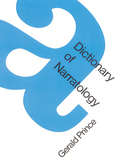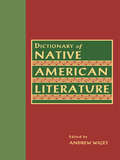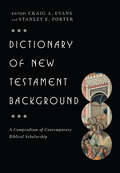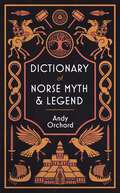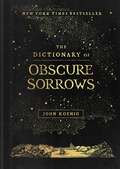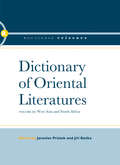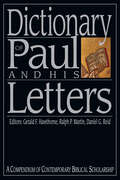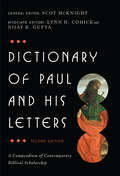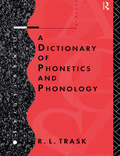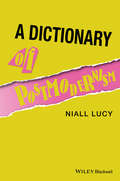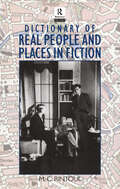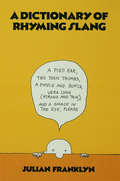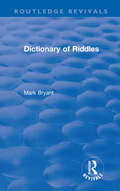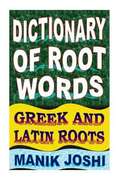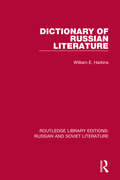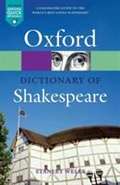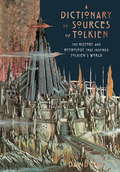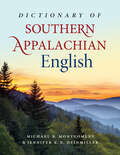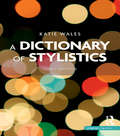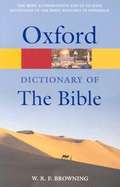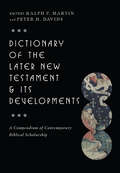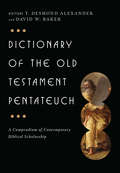- Table View
- List View
A Dictionary of Narratology
by Gerald PrinceHistory, literature, religion, myth, film, psychology, theory, and daily conversation all rely heavily on narrative. Cutting across many disciplines, narratology describes and analyzes the language of narrative with its regularly recurring patterns, deeply established conventions for transmission, and interpretive codes, whether in novels, cartoons, or case studies. Indispensable to writers, critics, and scholars in many fields, A Dictionary of Narratology provides quick and reliable access to terms and concepts that are defined, illustrated, and cross-referenced. All entries are keyed to articles or books in which the terms originated or are exemplified. This revised edition contains additional entries and updates some existing ones.
Dictionary of Native American Literature (Garland Reference Library Of The Humanities Ser. #Vol. 1815)
by Andrew WigetFirst Published in 1995. Routledge is an imprint of Taylor & Francis, an informa company.
Dictionary of New Testament Background: A Compendium of Contemporary Biblical Scholarship (The IVP Bible Dictionary Series)
by Craig A. Evans Stanley E. PorterDictionary of New Testament BackgroundDictionary of Jesus and the Gospels, the Dictionary of Paul and His LettersDictionary of the Later New Testament and Its DevelopmentsDictionary of New Testament BackgroundDictionaryDictionary of New Testament Background
Dictionary of Newfoundland English
by W. J. Kirwin G. M. Story J.D.A. WiddowsonThe Dictionary of Newfoundland English, first published in 1982 to regional, national and international acclaim, is a historical dictionary that gives the pronunciations and definitions for words that the editors have called "Newfoundland English". The varieties of English spoken in Newfoundland date back four centuries, mainly to the early seventeenth century migratory English fishermen of Cornwall, Devon, Dorset and Somerset, and to the seventeenth to the nineteenth century immigrants chiefly from south-eastern Ireland. Culled from a vast reading of books, newspapers and magazines, this book is the most sustained reading ever undertaken of the written words of this province. The dictionary gives not only the meaning of words, but also presents each word with its variant spellings. Moreover, each definition is succeeded by an all-important quotation of usage which illustrates the typical context in which word is used. This well-researched, impressive work of scholarship illustrates how words and phrases have evolved and are used in everyday speech and writing in a specific geographical area. The Dictionary of Newfoundland English is one of the most important, comprehensive and thorough works dealing with Newfoundland. Its publication, a great addition to Newfoundlandia, Canadiana and lexicography, provides more than a regional lexicon. In fact, this entertaining and delightful book presents a panoramic view of the social, cultural and natural history, as well as the geography and economics, of the quintessential lifestyle of one of Canada's oldest European-settled areas. This second edition contains a Supplement offering approximately 1500 new or expanded entries, an increase of more than 30 per cent over the first edition. Besides new words, the Supplement includes modified and additional senses of old words and fresh derivations and usages.
Dictionary of Norse Myth & Legend
by Andrew OrchardFrom Loki to Thor, Ragnarok to BeowulfA gripping and truly mesmerising delve into the Norse legendsFrom bestselling books to blockbusting Hollywood movies, the myths of the Scandinavian gods and heroes are part of the modern day landscape.For over a millennium before the arrival of Christianity, the legends permeated everyday life in Iceland and the northern reaches of Europe. Since that time, they have been perpetuated in literature and the arts in forms as diverse as Tolkien and Wagner, graphic novels to the world of Marvel. This book covers the entire cast of supernatural beings, from gods to trolls, heroes to monsters, and deals with the social and historical background to the myths, topics such as burial rites, sacrificial practices and runes.
Dictionary of Norse Myth & Legend
by Andrew OrchardFrom Loki to Thor, Ragnarok to BeowulfA gripping and truly mesmerising delve into the Norse legendsFrom bestselling books to blockbusting Hollywood movies, the myths of the Scandinavian gods and heroes are part of the modern day landscape.For over a millennium before the arrival of Christianity, the legends permeated everyday life in Iceland and the northern reaches of Europe. Since that time, they have been perpetuated in literature and the arts in forms as diverse as Tolkien and Wagner, graphic novels to the world of Marvel. This book covers the entire cast of supernatural beings, from gods to trolls, heroes to monsters, and deals with the social and historical background to the myths, topics such as burial rites, sacrificial practices and runes.
The Dictionary of Obscure Sorrows
by John KoenigA truly original book in every sense of the word, The Dictionary of Obscure Sorrows poetically defines emotions that we all feel but don&’t have the words to express, until now—from the creator of the popular online project of the same name.Have you ever wondered about the lives of each person you pass on the street, realizing that everyone is the main character in their own story, each living a life as vivid and complex as your own? That feeling has a name: &“sonder.&” Or maybe you&’ve watched a thunderstorm roll in and felt a primal hunger for disaster, hoping it would shake up your life. That&’s called &“lachesism.&” Or you were looking through old photos and felt a pang of nostalgia for a time you&’ve never actually experienced. That&’s &“anemoia.&” If you&’ve never heard of these terms before, that&’s because they didn&’t exist until John Koenig began his epic quest to fill the gaps in the language of emotion. Born as a website in 2009, The Dictionary of Obscure Sorrows has garnered widespread critical acclaim, inspired TED talks, album titles, cocktails, and even tattoos. The Dictionary of Obscure Sorrows &“creates beautiful new words that we need but do not yet have,&” says John Green, bestselling author of The Fault in Our Stars. By turns poignant, funny, and mind-bending, the definitions include whimsical etymologies drawn from languages around the world, interspersed with otherworldly collages and lyrical essays that explore forgotten corners of the human condition—from &“astrophe,&” the longing to explore beyond the planet Earth, to &“zenosyne,&” the sense that time keeps getting faster. The Dictionary of Obscure Sorrows is for anyone who enjoys a shift in perspective, pondering the ineffable feelings that make up our lives, which have far more in common than we think. With a gorgeous package and beautifully illustrated throughout, this is the perfect gift for creatives, word nerds, and people everywhere.
Dictionary of Oriental Literatures 3: West Asia and North Africa
by Jaroslav Průšek Jirí BeckaThe Dictionary of Oriental Literatures fills a long-felt gap in Western literature by presenting a concise summary, in three volumes and about 2000 articles, of practically all the literatures of Asia and North Africa. The first volume describes the Chinese, Tibetan, Japanese, Korean and Mongolian literatures; the second covers the area of South and South-East Asia, comprising, besides all literatures of India and Pakistan, those of Nepal, Bangladesh, Sri Lanka, Myanmar, Thailand, Cambodia, Vietnam, Indonesia, Malaysia and the Philippines; and the third is devoted to the numerous literatures of West Asia and North Africa. including on the one hand the literatures of the ancient Near East and Egypt, and on the other hand those of Central Asia and the Caucasus, of Turkey, Iran, Afghanistan and of the various Arab countries including Morocco, Tunisia and Algeria. The majority of entries give information about the life and work of the individual writers and poets of the classical, medieval and modern periods of the literatures included and also attempt to evaluate their writings from the historical and aesthetic point of view. The remaining articles describe literary terms, genres, forms, schools, movements etc. The Dictionary has been prepared by the Oriental Institute in Prague under the supervision of a Advisory Editorial Board of European and American scholars of international reputation and is unique in that it is the fruit of the collaboration of over 150 orientalists from many parts of the world. Contents include: Volume I East Asia: The Far East, including Chinese, Tibetan, Japanese, Korean and Mongolian literatures. Volume II South and South-East Asia: Ancient Indian, Assamese, Baluchi, Bengali, Gujarati, Hindi, Indian literature in English, Indo-Persian, Kannada, Kashmiri, Maithili, Malayalam, Marathi, Oriya, Panjabi, Pashto, Rajasthani, Sindhi, Tamil, Telugu and Urdu, Sinhalese, Nepali, Burmese, Thai, Cambodian, Malay and Indonesian, Javanese, Vietnamese and Philippines literatures. Volume III West Asia and North Africa: The Near East and Egypt, Central Asia and the Caucasus, Turkish, Persian, Afghan, Kurd and Arabic literatures, covering all the Arab states from Iraq in the East to Algeria in the West.
Dictionary of Paul and His Letters: A Compendium of Contemporary Biblical Scholarship (The IVP Bible Dictionary Series)
by Gerald F. HawthorneDictionary of Paul and His LettersDictionary of Jesus and the GospelsDictionaryDictionary of Paul and His LetterssummaDictionary of Paul and His LettersDictionary of Jesus and the Gospels
Dictionary of Paul and His Letters: A Compendium of Contemporary Biblical Scholarship (The IVP Bible Dictionary Series)
by Scot McKnight Lynn H. Cohick Nijay K. GuptaThe Dictionary of Paul and His Letters is a one-of-a-kind reference work. No other resource presents as much information focused exclusively on Pauline theology, literature, background, and scholarship. This second edition is a thoroughly revised and updated version of the acclaimed 1993 publication. Since that groundbreaking volume was published, developments in Pauline studies have continued at a rapid pace, with diverse new scholars entering the conversation, new ideas and methods gaining attention, and fresh expressions of old topics shaping the present discussion. Those who enjoyed and benefited from the wealth in the first edition will find this new edition an equally indispensable and freshly up-to-date companion to study and research. Classic topics such as Christology, justification, hermeneutics, and book studies of individual epistles receive careful treatment by specialists in the field. Topics new to this edition—including Paul and politics, patronage, and interpretations from various historical and cultural perspectives—expand the volume's breadth and usefulness. Over 95% of the articles have been written specifically for this edition. This work bridges the gap between scholars and pastors, teachers and students, and all interested readers who want a thorough treatment of key topics in a summary format. In curating and compiling these articles, the editors have sought to make them comprehensive, accessible, and useful for those pursuing further research on particular subjects. Each article's bibliography, in addition, will serve a new generation of readers for years to come. The updated Dictionary of Paul and His Letters takes its place alongside the Dictionary of Jesus and the Gospels, 2nd ed., and the other volumes in the IVP Bible Dictionary Series as a unique presentation of the fruit of biblical studies—committed to Scripture, using the best of critical methods, and maintaining dialogue with both contemporary scholarship and the challenges facing the church. The reference volumes in the series provide in-depth treatment of biblical and theological topics in an accessible encyclopedia format, including cross-sectional themes, methods of interpretation, significant historical or cultural background, and each Old and New Testament book as a whole.
A Dictionary of Phonetics and Phonology
by R.L. TraskWritten for students of linguistics, applied linguistics and speech therapy, this dictionary covers over 2,000 terms in phonetics and phonology. In addition to providing a comprehensive, yet concise, guide to an enormous number of individual terms, it also includes an explanation of the most important theoretical approaches to phonology. Its usefulness as a reference tool is further enhanced by the inclusion of pronunciations, notational devices and symbols, earliest sources of terms, suggestions for further reading, and advice with regard to usage.The wide range of topics explained include: * Classical phonology, including American Structuralism and the Prague School * Contemporary approaches, including Autosegmental Phonology, Metrical Phonology, Dependency Phonology, Government Phonology and Lexical Phonology * Prosodic ideas in phonology, both traditional and contemporary ^ * * historical phonology * Intonation and tonology This dictionary devotes space to the various theoretical approaches in proportion to their importance, but it concentrates most heavily on non-theory-bound descriptive terminology. It will remain a definitive reference for years to come.
A Dictionary of Postmodernism
by Niall LucyA Dictionary of Postmodernism presents an authoritative A-Z of the critical terms and central figures related to the origins and evolution of postmodernist theory and culture. Explores the names and ideas that have come to define the postmodern condition – from Baudrillard, Jameson, and Lyotard, to the concepts of deconstruction, meta-narrative, and simulation – alongside less canonical topics such as dialogue and punk Includes essays by the late Niall Lucy, a leading expert in postmodernism studies, and by other noted scholars who came together to complete and expand upon his last work Spans a kaleidoscope of postmodernism perspectives, addressing its lovers and haters; its movers and shakers such as Derrida; its origins in modernism and semiotics, and its outlook for the future Features a series of brief essays rather than fixed definitions of the key ideas and arguments Engaging and thought-provoking, this is at once a scholarly guide and enduring reference for the field
Dictionary of Real People and Places in Fiction
by M.C. RintoulFascinating and comprehensive in scope, the Dictionary of Real People and Places in Fiction is a valuable source for both students and teachers of literature, and for those interested in locating the facts behind the fiction they read. In a single, scholarly volume, it provides intriguing insight into the real identity of people and places in the novels of over 300 American and British authors published in the nineteenth and twentieth centuries.
A Dictionary of Rhyming Slang
by Julian FranklynThis re-issue of Julian Franklyn's classic dictionary not only defines these expressions but also explains their origin and history. An introductory essay examines the roots and development of rhyming slang. Although many people assume that rhyming slang is exclusively Cockney, Franklyn illustrates how it is common to Australian and Americn dialects. From the unlikely to the bizarre, the 1,500 entries both entertain and enlighten. Cartoons enliven a reference section which combines linguistic detail and cultural analysis. Whether reading the dictionary from cover to cover, or dipping into it as a reference tool, linguists and students of popular culture will find it the definitive source of information on rhyming slang.
Dictionary of Riddles (Routledge Revivals)
by Mark BryantOriginally published in 1990 by Routledge, Dictionary of Riddles is a collection of nearly 1500 of the most cryptic and entertaining riddles from history. Drawn from sources throughout the world, the collection ranges from earthy medieval jokes about fleas, worms and vegetables to the sophisticated puzzles composed by literary figures from Schiller, Swift, Voltaire, Rousseau and Cervantes to Edgar Allan Poe, Lewis Carroll and J.R.R. Tolkien. The book traces the history of riddles from their origins in antiquity through the golden age of the Renaissance, to their decline into the nursery and the first few signs of their modern revival, and draws together all the strands of the riddling art. Dictionary of Riddles received a Special Commendation in Reference Review’s Best Specialist Reference Books of 1990 Awards.
Dictionary of Root Words Greek and Latin Roots: English Word Power
by Manik JoshiDictionary of Root Words Greek and Latin Roots
Dictionary of Russian Literature (Routledge Library Editions: Russian and Soviet Literature #3)
by William E. HarkinsThis book, first published in 1957, provides essential information on the entire field of Russian literature, as well as a great deal on literary criticism, journalism, philosophy, theatre and related subjects. Russian literary tradition has tended to blur the distinctions between social and political criticism on one hand, and literary criticism on the other, and even, to an extent, the distinction between philosophy and literature. Although intended primarily as a reference work, this book also contains much critical analysis.
A Dictionary of Shakespeare
by Stanley WellsCompiled by the general editor of The Oxford Shakespeare, and one of the best-known authorities on the playwright's works, this dictionary offers information on all aspects of Shakespeare, both in his own time and in later ages. The wide-ranging entries cover Shakespeare's plays, as well as everything from famous actors, writers, and directors connected with Shakespeare, to theatres, historical figures and places of particular interest relating to his life and work. The dictionary also includes box features of passages on Shakespeare by other famous authors, from Dr. Johnson and Jane Austin to Bernard Levin and Virginia Woolf. Ideal reference for the student, actor, or director, and fascinating browsing for the general reader interested in Shakespeare's life and work.
A Dictionary of Sources of Tolkien: The History and Mythology That Inspired Tolkien's World
by David DayThe spellbinding world of Middle-earth is full of beasts and battles, heroes and heroines, and the struggle between good and evil.In this dictionary of sources, Tolkien scholar and best-selling author David Day's four decades of research inform us about the lands, inhabitants, languages, geography and history of Middle-earth.This compelling encyclopedia on Tolkien's world also includes over 200 illustrations and an appendix.This work is unofficial and is not authorized by the Tolkien Estate or HarperCollins Publishers.
A Dictionary of Sources of Tolkien: The History and Mythology That Inspired Tolkien's World
by David DayThe spellbinding world of Middle-earth is full of beasts and battles, heroes and heroines, and the struggle between good and evil.In this dictionary of sources, Tolkien scholar and best-selling author David Day's four decades of research inform us about the lands, inhabitants, languages, geography and history of Middle-earth.This compelling encyclopedia on Tolkien's world also includes over 200 illustrations and an appendix.This work is unofficial and is not authorized by the Tolkien Estate or HarperCollins Publishers.
Dictionary of Southern Appalachian English
by Michael B. Montgomery & Jennifer K. N. HeinmillerThe Dictionary of Southern Appalachian English is a revised and expanded edition of the Weatherford Award–winning Dictionary of Smoky Mountain English, published in 2005 and known in Appalachian studies circles as the most comprehensive reference work dedicated to Appalachian vernacular and linguistic practice. Editors Michael B. Montgomery and Jennifer K. N. Heinmiller document the variety of English used in parts of eight states, ranging from West Virginia to Georgia—an expansion of the first edition's geography, which was limited primarily to North Carolina and Tennessee—and include over 10,000 entries drawn from over 2,200 sources. The entries include approximately 35,000 citations to provide the reader with historical context, meaning, and usage. Around 1,600 of those examples are from letters written by Civil War soldiers and their family members, and another 4,000 are taken from regional oral history recordings. Decades in the making, the Dictionary of Southern Appalachian English surpasses the original by thousands of entries. There is no work of this magnitude available that so completely illustrates the rich language of the Smoky Mountains and Southern Appalachia.
A Dictionary of Stylistics
by Katie WalesReviews of the first edition:'...a work of high seriousness...manna from rhetorical heaven for students and researchers with a lot of hard graft ahead of them... '(English Today)'...an impressive single-author reference work... '(English)'...Not only is this volume indispensible for anyone, students or academics, working in any field related to stylistics, it is, like all the best dictionaries, a very good read...' (Le Lingue del Mondo) Over the past ten years there have been striking advances in stylistics. These have given rise to new terms and to revised thinking of concepts and re-definitions of terms. A Dictionary of Stylistics, 2nd Edition contains over 600 alphabeticlly listed entries: fully revised since the first and second editions, it contains many new entries.Drawing material from stylistics and a range of related disciplines such as sociolinguistics, cognitive linguistics and traditional rhetoric, the revised Third Edition provides a valuable reference work for students and teachers of stylistics, as well as critical discourse analysis and literary criticism. At the same time it provides a general picture of the nature, insights and methodologies of stylistics. As well as explaining terminology clearly and concisely, this edition contains a subject index for further ease of use.With numerous quotations; explanations for many basic terms from grammar and rhetoric; and a comprehensive bibliography, this is a unique reference work and handbook for stylistic and textual analysis. Students and teachers at secondary and tertiary levels of English language and literature or English as a foreign or second language, and of linguistics, will find it an invaluable source of information.Katie Wales is Professor of Modern English Language, University of Leeds and Dean of Learning and Teaching in the Faculty of Arts.
A Dictionary of the Bible
by W. R. F. BrowningThis revised edition is the most authoritative, accessible, and up-to-date dictionary of the Bible available in paperback. As well as providing helpful information about important places and personalities, it is particularly concerned to expound the themes and doctrines of the Bible and to indicate their status in the light of modern scholarship. With entries ranging from earthquakes and mice to feminism and the Dead Sea Scrolls, the dictionary is a lively and absorbing reference work for all readers of the Bible. -Over 2,000 entries from Adam to Zechariah -Clear explanations of technical terms, methods of interpretation, and critical analysis, as well as notes on leading biblical scholars and their contributions -Broad coverage includes the books of the Bible, people and places, customs, religions and worship, history, and theology -Takes into account the work of Christian scholars of all denominations and Jewish scholars
Dictionary of the Later New Testament & Its Developments: A Compendium of Contemporary Biblical Scholarship (The IVP Bible Dictionary Series)
by Ralph P. Martin Peter H. DavidsChristianity Today'sDictionary of the Later New Testament & Its DevelopmentsDictionary of the Later New Testament & Its DevelopmentsDictionary of Jesus and the GospelsDictionary of Paul and His Letters
Dictionary of the Old Testament: A Compendium of Contemporary Biblical Scholarship (The IVP Bible Dictionary Series)
by T. Desmond AlexanderA 2003 LOGOS Book Award WinnerAn ECPA 2003 Gold Medallion Finalist The first five books of the Old Testament lay the foundation on which the rest of Scripture stands. Its great themes, epochal events and towering figures set down vectors on which the biblical story is played out. The very shape of the rest of the Old Testament would collapse were the Penteteuch to be removed. The structure of New Testament thought would be barely intelligible without it. Here we meet the great ancestral figures of Israel--Abraham, Isaac and Jacob--and the towering figure of Moses, whose presence dominates four of these five books. The creative act of God, the paradisal garden, the exile of Adam and Eve, the judgment of the great flood, the call of Abraham from among the nations, the covenant of Abraham, the exodus from Egypt, the giving of the law at Sinai, the plan of the tabernacle, the varied experiences of Israel in the wilderness, and the announcement of the covenant blessings and curses--all of these and more contribute to a work of world-formative power. This dictionary explores the major themes and contours of the Pentateuch. Behind and beneath the grandeur of the Pentateuch, issues of historicity have both puzzled and beckoned. But whereas in the mid-twentieth century many English-speaking scholars were confident of archaeological support for the patriarchal accounts, the climate has now changed. In the most extreme cases, some contemporary scholars have radically challenged the antiquity of the ancestral stories, arguing for their final composition even as late as the Hellenistic era. This dictionary examines and weighs the historical issues and poses possible solutions. The documentary hypothesis, the former reigning critical consensus, is now widely rumored to be on life support with no heir apparent. Meanwhile, conservative scholars reconsider what indeed a claim to Mosaic authorship should entail. This dictionary offers an assessment of the array of questions surrounding these issues and considers some possible ways forward for evangelical scholarship. At the same time, there has been a fruitful turning to the nature, message and art of the received text of the Pentateuch. Literary studies of brief episodes, sprawling sagas, complex narrative and even the fivefold composition of the Pentateuch itself have delivered promising and exciting results. This dictionary offers both appreciative panoramas and close-up assessments of these developments and their methods. The Dictionary of the Old Testament: Pentateuch is the first in a four-volume series covering the text of the Old Testament. Following in the tradition of the four award-winning IVP dictionaries focused on the New Testament and its background, this encyclopedic work is characterized by close attention to the text of the Old Testament and the ongoing conversation of contemporary scholarship. In exploring the major themes and issues of the Pentateuch, editors T. Desmond Alexander and David W.Baker, with an international and expert group of scholars, inform and challenge through authoritative overviews, detailed examinations and new insights from the world of the ancient Near East. The Dictionary of the Old Testament: Pentateuch is designed to be your first stop in the study and research of the Pentateuch, on which the rest of the Bible is built. Note: Because this ebook is large, please allow a little extra time to download after purchase.
